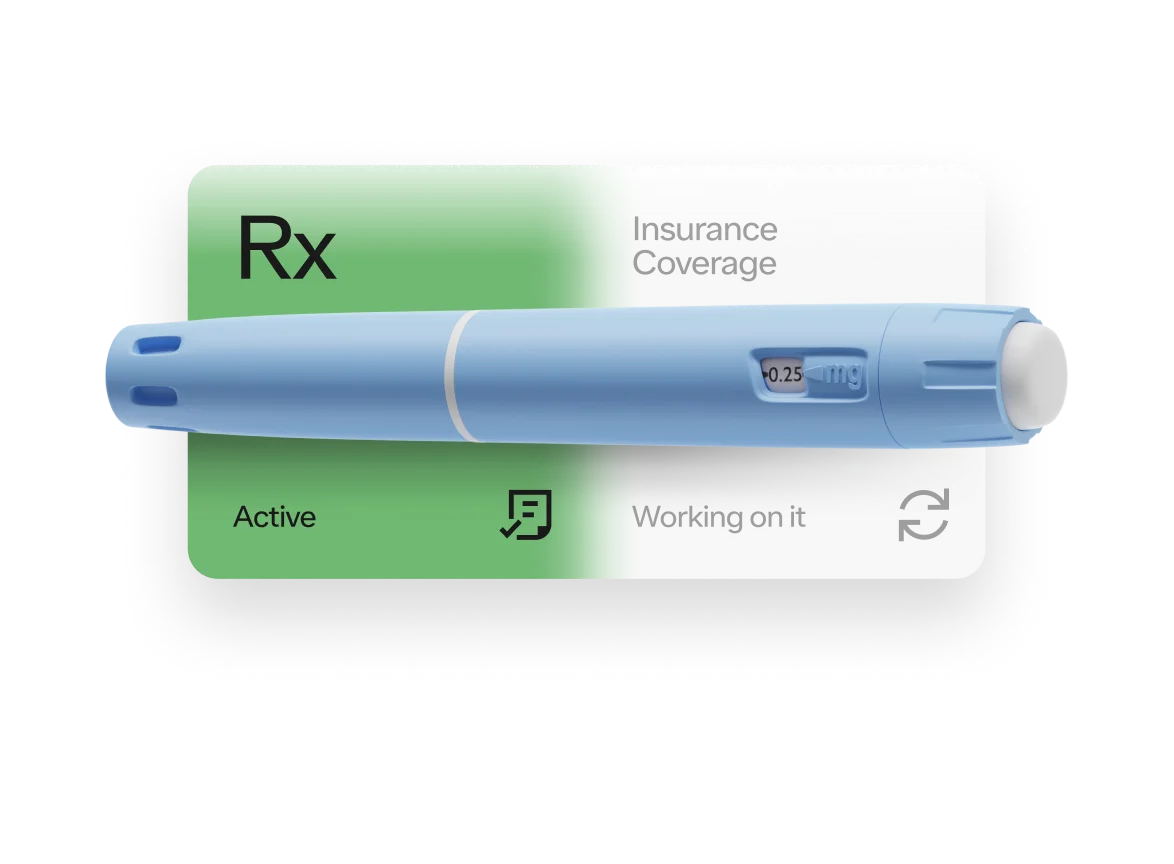Key takeaways
Medicare Part D generally covers Ozempic when it’s prescribed for an FDA-approved indication, such as treating type 2 diabetes, lowering cardiovascular risk in people with type 2 diabetes and heart disease, or reducing the risk of kidney decline in people with type 2 diabetes and kidney disease.
Medicare does not cover Ozempic when prescribed off-label for weight loss or prediabetes.
Prior authorization is often required before Medicare will approve coverage for Ozempic.
Here's what we'll cover
Here's what we'll cover
Here's what we'll cover
Key takeaways
Medicare Part D generally covers Ozempic when it’s prescribed for an FDA-approved indication, such as treating type 2 diabetes, lowering cardiovascular risk in people with type 2 diabetes and heart disease, or reducing the risk of kidney decline in people with type 2 diabetes and kidney disease.
Medicare does not cover Ozempic when prescribed off-label for weight loss or prediabetes.
Prior authorization is often required before Medicare will approve coverage for Ozempic.
If you’ve been prescribed Ozempic (semaglutide) and you’re on Medicare, you’re probably wondering: Does Medicare cover Ozempic?
Here’s the short answer: It depends on why you’re taking Ozempic. The US Food and Drug Administration (FDA) has approved Ozempic for three indications:
To control blood sugar levels, along with diet and exercise, in adults with type 2 diabetes
To lower the risk of a major cardiovascular event (e.g. heart attack, stroke) in adults with type 2 diabetes and cardiovascular disease
To reduce the risk of worsening kidney disease, kidney failure, and cardiovascular disease-related death in adults with type 2 diabetes and chronic kidney disease
When prescribed for one of these conditions, Medicare Part D generally covers Ozempic. However, if you’re taking Ozempic off-label for weight loss or to manage prediabetes, Medicare won’t cover it.
Here’s what you need to know about Medicare coverage for Ozempic, how much your monthly Rx might cost, and what to do if your plan doesn’t cover it.
Does Medicare cover Ozempic?
Yes, Medicare Part D covers Ozempic when prescribed for an FDA-approved indication, such as controlling type 2 diabetes or lowering the risk of heart or kidney disease in adults with type 2 diabetes and either heart or kidney disease. According to the latest data from 2023, over 1.4 million Medicare enrollees received coverage for Ozempic.
Note that not everyone on Medicare has drug coverage. Ozempic isn’t covered under Medicare Part B, which helps cover things like doctor visits, preventive services (e.g. flu shots), and certain medical supplies (e.g. diabetic test strips). If the only Medicare card in your wallet is Part A/B (the red, white, and blue card), it won’t cover Ozempic. Medicare Part D is the part of Medicare that helps cover prescription medications, but it’s optional, and you have to sign up for it through an insurance company that works with Medicare. To learn even more about Medicare drug plans, visit medicare.gov.
Does Medicare cover Ozempic for type 2 diabetes?
Yes, Medicare Part D and Medicare Advantage plans with prescription drug coverage typically include Ozempic on their formularies for people with type 2 diabetes. Ozempic is FDA-approved to lower blood sugar in adults with type 2 diabetes when used in combination with diet and exercise.
Does Medicare cover Ozempic for reducing cardiovascular risk?
Ozempic is also FDA-approved to lower the risk of major cardiovascular events, like heart attack, death, or stroke, in adults with type 2 diabetes and heart disease. When prescribed for this reason, Medicare plans cover Ozempic.
Does Medicare cover Ozempic for reducing kidney disease risk?
Yes, Medicare covers Ozempic when prescribed to slow the progression of kidney disease in adults with type 2 diabetes and kidney disease. Ozempic is FDA-approved to reduce the risk of worsening kidney disease, kidney failure, and cardiovascular death in adults with type 2 diabetes and kidney disease.
Does Medicare cover Ozempic for prediabetes?
No, Medicare does not cover Ozempic when prescribed for prediabetes because it is not an approved indication of the drug. Ozempic is only FDA-approved for use in people who already have type 2 diabetes. Using Ozempic for prediabetes is considered off-label, which means Medicare won’t pay for it.
Does Medicare cover Ozempic for weight loss?
No, Medicare does not cover Ozempic for weight loss. While people can lose weight on Ozempic—up to 15 pounds in 10 months, according to one study—weight loss is not an approved indication for Ozempic. As such, Medicare will not cover it when prescribed for this reason. Even if the FDA approved Ozempic for weight loss, Medicare still could not cover it. That’s because Medicare is currently legally prohibited from covering drugs specifically approved for weight loss and management.
Most likely, yes. Even if you meet the eligibility criteria for Ozempic (e.g. you’re an adult with type 2 diabetes who needs Ozempic for one of the reasons outlined above), many Medicare Part D plans require prior authorization for Ozempic. This means your doctor must submit paperwork confirming that the drug is medically necessary for your condition before your plan will cover it.
Some Medicare plans may also require documentation that you’ve first tried other treatment options to manage your condition, such as lifestyle changes or other medications. You may see this referred to as “step therapy” by your plan.
How to check if Medicare covers Ozempic
If you’re not sure if your Medicare plan covers Ozempic, contact your plan administrator. They can tell you whether your plan includes coverage for Ozempic and if prior authorization is required. You can also review your drug’s formulary, which includes a list of all the drugs covered by your plan, to see if Ozempic is covered.
Another option is to use Ro’s GLP-1 Insurance Coverage Checker, a free and accessible online tool. Simply fill out the form with the information on your insurance card, and Ro will send you a free, personalized coverage report based on their conversation with your plan.
To qualify for an Ozempic prescription under Medicare, you’ll need:
A diagnosis of type 2 diabetes (required for all approved uses of Ozempic)
A Part D or Medicare Advantage plan that includes Ozempic on its formulary
A valid prescription from a licensed healthcare provider
A prior authorization request submitted to Medicare by that provider that confirms you need Ozempic to control your blood sugar levels, reduce your cardiovascular risk, or slow your kidney decline
Cost of Ozempic with Medicare
Without insurance, the list price of Ozempic starts at $997.58 for a one-month supply. If your Medicare plan covers Ozempic, you’ll pay much less—between $3 and $106, on average. In 2023, Medicare enrollees paid $106 out-of-pocket for a monthly fill of Ozempic, on average. If you qualify for the low-income subsidy (LIS) benefit, your cost will be even lower. In 2023, Medicare enrollees who qualified for the LIS benefit paid $3 per month out-of-pocket.
The specific price Medicare beneficiaries pay for Ozempic depends on the drug’s tier. Medicare plans typically categorize Ozempic as a Tier 3 or higher drug, which is why it may have a higher out-of-pocket price than other medications in your regimen.
What if Medicare won’t cover Ozempic
Most Medicare Part D plans cover Ozempic when prescribed for an FDA-approved indication. But if your plan doesn’t cover Ozempic, you still have a few options.
If your plan denies your prior authorization request, you and your healthcare provider can file an appeal. If your plan’s formulary doesn’t include Ozempic, your healthcare provider can request a formulary exception on your behalf.
If neither of these avenues works out, you can ask your healthcare provider if an Ozempic alternative could also be a suitable treatment for you. Ozempic is one of several GLP-1 medications that can be prescribed to treat type 2 diabetes, some of which may be covered by your plan or cost less out-of-pocket than Ozempic. For example:
Rybelsus (semaglutide) is an oral medication that has the same active ingredient as Ozempic. It is FDA-approved to lower blood sugar levels in adults with type 2 diabetes. Without insurance, Rybelsus costs the same as Ozempic, but when covered by Medicare, it has a lower out-of-pocket cost than Ozempic.
Trulicity (dulaglutide) is an injectable diabetes medication like Ozempic. It is FDA-approved to treat type 2 diabetes and to reduce cardiovascular risk in adults with type 2 diabetes and heart disease. Without insurance, Trulicity costs about $11 less than Ozempic.
Victoza (liraglutide) is another injectable diabetes medication. It is FDA-approved to manage type 2 diabetes and reduce cardiovascular risks in people with diabetes and heart disease. The list price of Victoza ranges from $544 to $825, depending on the dose.
How to save on Ozempic if Medicare won’t cover it
If your Medicare plan won’t cover Ozempic, there are still ways you can save. Lower your out-of-pocket cost with these tips.
Price shop. Call different pharmacies near you to find out who sells Ozempic for less. You may also be able to find a better price for Ozempic with an online pharmacy. Before getting Ozempic online, double-check the pharmacy is legit. According to the FDA’s safety guidelines, a safe, legal online pharmacy will require a valid prescription from a healthcare provider, have a US address and telephone number, and is licensed by your state board of pharmacy, which you can verify online via the FDA’s BeSafeRx website .
Order a three-month supply. Sometimes, larger refills are more cost-effective on a per-dose basis than a standard one-month supply.
Use a pharmacy discount card. These cards—which are available for free from sites like GoodRx, SingleCare, or Optum Perks—essentially function as Ozempic coupons. You simply visit the website, find your pharmacy and prescribed dosage of Ozempic, and download or save the card to show your pharmacist when you pick up your prescription.
Bottom line
Ozempic is a popular medication that effectively manages type 2 diabetes and offers benefits for those also living with heart or kidney disease. It can also be prescribed off-label for weight loss, polycystic ovarian syndrome (PCOS), and prediabetes. Here’s what to keep in mind if you're hoping to get Ozempic covered by Medicare:
Medicare Part D plans usually cover Ozempic, but only when it’s prescribed to manage type 2 diabetes, lower cardiovascular risk in people with type 2 diabetes and heart disease, or slow kidney decline in people with type 2 diabetes and chronic kidney disease.
Medicare will not cover Ozempic for an off-label diagnosis, such as weight loss or prediabetes.
Many Medicare plans require prior authorization before they’ll cover Ozempic. If your request is denied, you can have your healthcare provider submit an appeal.
Ozempic usually has a higher out-of-pocket cost than other drugs on Medicare, given that it’s categorized as a Tier 3 or higher drug.
If your Medicare plan doesn’t cover Ozempic, you can request a formulary exception, compare prices and use pharmacy discount cards, or ask your doctor about alternative medications that may be covered.
Frequently asked questions (FAQs)
How can you get Ozempic for free with Medicare?
It’s rare to get Ozempic completely free, even with Medicare coverage. Generally, Ozempic costs $106 out-of-pocket per month, on average, for people with Medicare Part D coverage. If you qualify for the low-income subsidy, your average monthly out-of-pocket cost may be as low as $3. Once you hit your out-of-pocket maximum for the year, you may be able to get Ozempic for free with Medicare.
What diagnosis will cover Ozempic?
Insurance usually only covers Ozempic when it is prescribed for an approved condition. These diagnoses include: type 2 diabetes, type 2 diabetes and cardiovascular disease, and type 2 diabetes and chronic kidney disease. Insurance will typically not cover Ozempic when it is prescribed to treat an off-label diagnosis, such as obesity, prediabetes, or PCOS.
DISCLAIMER
If you have any medical questions or concerns, please talk to your healthcare provider. The articles on Health Guide are underpinned by peer-reviewed research and information drawn from medical societies and governmental agencies. However, they are not a substitute for professional medical advice, diagnosis, or treatment.
Ozempic Important Safety Information: Read more about serious warnings and safety info.
GLP-1 Important Safety Information: Read more about serious warnings and safety info.
References
Blue Cross Blue Shield of Michigan (2025). How Do Drug Tiers Work?. Retrieved from https://www.bcbsm.com/medicare/help/using-your-plan/drug-tiers/
CMS.gov. (2024). Exceptions. US Centers for Medicare & Medicaid Services. Retrieved from https://www.cms.gov/medicare/appeals-grievances/prescription-drug/exceptions
Eli Lilly. (2025). How much should I expect to pay for Trulicity (dulaglutide)?. Retrieved from https://pricinginfo.lilly.com/trulicity
Frías, J. P., Auerbach, P., Bajaj, H. S., et al. (2021). Efficacy and safety of once-weekly semaglutide 2·0 mg versus 1·0 mg in patients with type 2 diabetes (SUSTAIN FORTE): a double-blind, randomised, phase 3B trial. The Lancet. Diabetes & Endocrinology, 9(9), 563–574. doi: 10.1016/S2213-8587(21)00174-1. Retrieved from https://pubmed.ncbi.nlm.nih.gov/34293304/
Medicare.gov. (n.d.). Filing an appeal. US Centers for Medicare and Medicaid Services. Retrieved from https://www.medicare.gov/providers-services/claims-appeals-complaints/appeals
NovoCare-a. (2025). Find out the cost for Ozempic. Novo Nordisk. Retrieved from https://www.novocare.com/diabetes/products/ozempic/explaining-list-price.html
NovoCare-b. (2024). Find out the cost for Rybelsus. Novo Nordisk. Retrieved from https://www.novocare.com/diabetes/products/rybelsus/explaining-list-price.html
Office of the Assistant Secretary for Planning and Evaluation. (2024). Medicare Coverage of Anti-Obesity Medications (Issue Brief No. HP-2024-25). US Department of Health and Human Services. Retrieved from https://aspe.hhs.gov/sites/default/files/documents/127bd5b3347b34be31ac5c6b5ed30e6a/medicare-coverage-anti-obesity-meds.pdf
U.S. Food & Drug Administration (FDA-a). (2025). Highlights of Prescribing Information: Ozempic (semaglutide) injection, for subcutaneous use. Retrieved from https://www.accessdata.fda.gov/drugsatfda_docs/label/2025/209637s025lbl.pdf
U.S. Food & Drug Administration (FDA-b). (2025). Highlights of Prescribing Information: Rybelsus (semaglutide) tablets, for oral use. Retrieved from https://www.accessdata.fda.gov/drugsatfda_docs/label/2025/213051Orig1s020,213051Orig1s021lbl.pdf
U.S. Food & Drug Administration (FDA-a). (2024). Highlights of Prescribing Information: Trulicity (dulaglutide) injection, for subcutaneous use. Retrieved from https://www.accessdata.fda.gov/drugsatfda_docs/label/2024/125469s061s062lbl.pdf
U.S. Food & Drug Administration (FDA-c). (2025). How to Buy Medicines Safely From an Online Pharmacy. Retrieved from https://www.fda.gov/consumers/consumer-updates/how-buy-medicines-safely-online-pharmacy
U.S. Food & Drug Administration (FDA-b). (2024). Prescribing Information: Victoza (liraglutide) injection, for subcutaneous use. Retrieved from https://www.accessdata.fda.gov/drugsatfda_docs/label/2025/022341Orig1s042lbl.pdf
Young, G. M., Bansal, K., Riello, R. J., 3rd, et al. (2024). Medicare Coverage and Patient Out-of-Pocket Costs for Cardiovascular-Kidney-Metabolic Medications. JAMA Network Open, 7(5), e2412437. doi: 10.1001/jamanetworkopen.2024.12437. Retrieved from https://www.ncbi.nlm.nih.gov/pmc/articles/PMC11109768/














